The $20 billion InterContinental Hotels Group (IHG) purchased the Old Stone Farm at the crossroads of Clinton, Hyde Park, and Rhinebeck and plans to build a large resort hotel under the luxury “Six Senses” brand. In 2024, Hyde Park and Clinton Zoning Boards repeatedly DENIED the project which would violate Hyde Park’s Greenbelt protections, Clinton’s zoning laws and the Comprehensive Plans of both towns. IHG has used aggressive legal maneuvers to intimidate our town governments into steamrolling the project through, twisting the previous property owners’ special-use permit for a small (44 guests max) dude ranch into plans for a large-scale resort & spa and wedding venue. The project will devastate 32 acres of prime open farmland, choke off sensitive wetlands and habitats, pollute pristine waterways and clog our peaceful country roads.
Their plan includes:

5 endangered species including Blanding’s Turtle, Indiana Bat, Northern Long-eared Bat, Monarch Butterfly and Cat-tail Sedge are threatened. The development will cause irreversible environmental destruction. The proposal impacts land identified in Dutchess County Wetland Significant Biodiversity Areas and Important Areas for Rare Wetland Animals. This commercial development will create deadly roadways and barriers between wetlands and forests, the continuous habitats that many native and endangered species require for their seasonal migrations.

including surface water (streams and ponds), vital wetlands and, ultimately, our groundwater are harmed. Wastewater will be dumped into the Crum Elbow Creek. Science now shows the destructive impact of pharmaceutical, chemical and microplastic pollution that goes with the hotel and spa business, especially on bats, turtles and other diminishing wildlife AND humans.
Wetlands restoration is now recognized as a top priority nationwide and locally yet this project would actually increase wetlands destruction.

The developer’s own estimates show 458-608 vehicles entering and leaving each-day (not including delivery trucks). Besides the traffic nuisance, there will be air and noise pollution areawide. Increased traffic and noise are more than an annoyance for humans — they threaten nesting areas and major wildlife crossings, including for our endangered turtles. Heavy trucks will be almost constant as guests arrive and depart and food, supplies, and equipment are delivered multiple times each day. The resort’s garbage and snow removal needs will also increase the frequency of large truck equipment.

will be obliterated with light pollution, required for the hundreds of onsite guests and employees, 24/7. Artificial lighting is especially harmful to birds and insects, adding to biodiversity decline. The full-service hotel is also likely to impact the electrical grid with amenities such as air-conditioning, a restaurant, on-site transportation by golf carts, and general electrical service to the dozens of structures. The vulnerable condition of the power grid will create a need for generators, further increasing noise and disrupting the landscape.
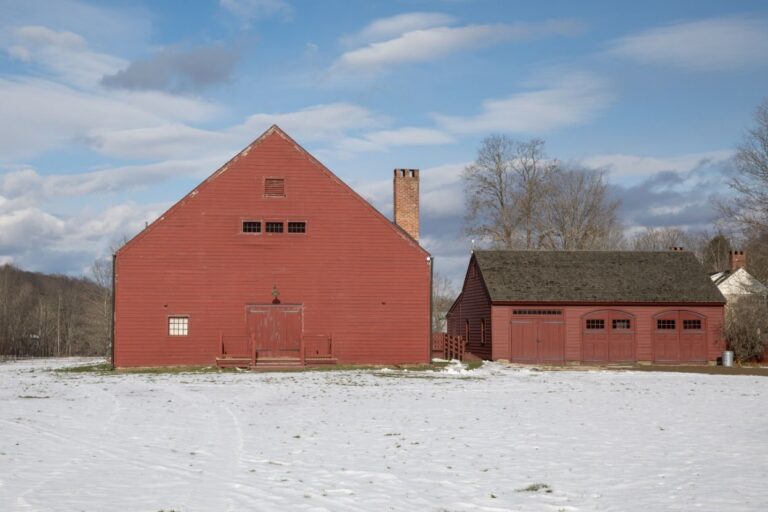
of our towns will be forever changed, while providing nothing for the town residents. The project flies in the face of Clinton’s own Comprehensive Plan, the Open Space Protection Plan, and the Conservation Advisory Council‘s work, ignoring the will of the people. Clinton has repeatedly said NO to Hotels.

Large continuous habitat is crucial for wildlife like bears, coyotes, bobcats, bats, owls, turtles and more. The additional roads and drives will fragment this habitat, disturbing or killing ground-nesting birds and migrating animals like endangered turtles and frogs. Route 9G already poses a mortal threat to seasonally migrating species from the Crum Elbow wetlands. Building new heavily traveled drives to the east, disrupting the connection between wetlands and forest, will trap them between two deadly roadways. New York’s environmental laws demand our towns be stewards of the land, not tools of big developers.
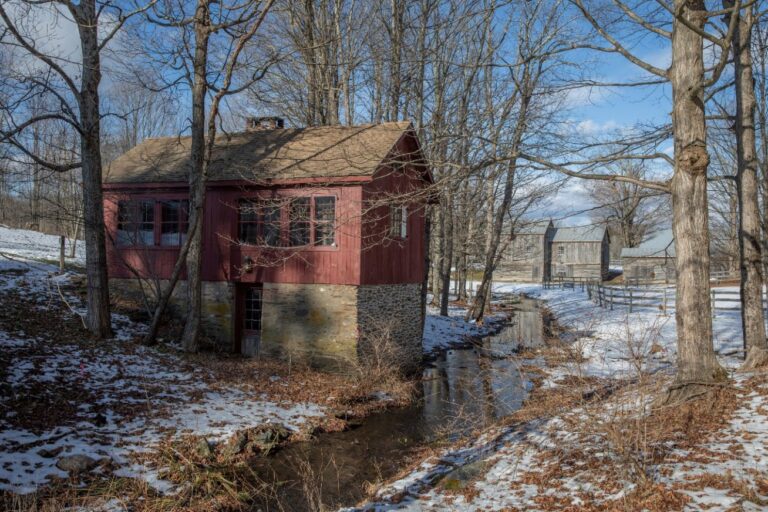
of our community will be marred, undermining open spaces of pristine farmlands and historic structures and upending conservation efforts that have taken years to put into place.

for local businesses and growing income inequality, especially for young people and working families. Management and directives will come from overseas, as will local management, so local jobs gained are likely to be exclusively lower-tier service work.
Local businesses will compete with the resort hotel for the limited workforce, driving up costs for existing local business owners and consumers.
The resort hotel will increase the need for emergency (police, fire, medical) and road maintenance services and vehicles, raising taxes for local property owners.
The potential for this property to be developed into 77 new homes is a fallacy being promoted by supporters of the Six Senses resort project to scare. In reality, the largest portion of Old Stone Farm that is in the Town of Clinton is generally in the AR5 zoning district, requiring either agricultural use or single-family residential use with 5-acre minimum lots. (A smaller part of the farm is located in the AR3 zoning district, which allows for 3-acre minimum residential lots.)
As the “Constraints Map” portrays, most of the property consists of either steep hilly woodlands (red) with numerous rocky outcroppings or wetlands (green) that are protected by federal, state, and/or local law, plus wetlands setbacks (blue dotted line) so residential development would be either unfeasible or prohibited there. The area that would be open to development – the same area on which Six Senses wants to place 54 buildings and 10 swimming pools – is approximately 32 acres of flat and fertile farmland, which would realistically allow no more than 6-10 new homes. This translates into approximately 40 additional residents, who would be committed to our community (unlike transient hotel guests and a huge multinational hotel chain) and would have a much smaller impact on water use, traffic, pollution, and quality-of-life in our town than a large-scale resort with 240 guests, 150 employees, and 600 car trips every day.
It is worth remembering that Old Stone Farm was on the market for more than 2 years, before selling for $8.5 Million in late 2021 to people who planned to use it for biodynamic farming. It did NOT sell to a residential developer, even during late COVID, when demand for homes in the Hudson Valley peaked.
An additional constraint… all but 70 acres of the Clinton property is under Forest Tax Exemption Law Program (480-a) to reduce property taxes. Removal from the program would result in significant tax penalties and back taxes, making it cost prohibitive to develop on what little woodlands are not constrained by wetlands or steep grade.
If it operates as proposed, only registered guests and paid or invited attendees at special events (retreats, weddings, private parties, etc.) will have access to this resort, so local residents will not be able to use the pools and other amenities or book dinner reservations and spa services. Rates for a double room at typical Six Senses resorts in Europe and Asia (this will be the first one in North America, if it is approved) mainly range from $850 to more than $2,000 a night, out of reach for most Hudson Valley residents.
IHG, a $20 billion global corporation, has built large Six Senses resort hotels in some of the world’s most environmentally sensitive places. Developers tend to look for locations where legal protections are poorly defined, so that they can exploit loopholes, threaten (and bring) lawsuits against towns that fear high legal expenses, and run roughshod over small rural communities like ours. Once they get their way, the lawsuits often continue because they now know that the town can be bullied into allowing them to exploit local resources extracting maximum profits. Standing up against them before they incur more significant development expenses (and create permanent damage) is the most effective and cost-effective way to block their plans and protect our town.
IHG’s purchase of the Old Stone Farm in Clinton to build a Six Senses Resort Hotel may have predated announcement of plans to build a One&Only Resort. This unexpected competition (on top of existing competition from Mirbeau in Rhinebeck (VERY small in comparison) and other luxury hotels in the Hudson Valley) creates a real rush that IHG’s development of Six Senses Hudson Valley could fail to achieve expected profits, ultimately leading them to convert the property to a lower-end hotel brand (for example, Holiday Inn, another IHG brand), which the town could not prevent because a special use permit, once granted, attaches to the property itself and not to a specific hotel brand or property owner. They could sell it to another company or even abandon it altogether, leaving our town with the low-end or even deserted resort instead of the beautiful 200-year old farm that is there now.
A large resort hotel like Six Senses Hudson Valley would put a substantial strain on existing infrastructure and emergency resources. Clinton is blessed with fantastic volunteer fire and emergency services, but providing services for large commercial hospitality and events operations like this one will increase the number of calls they have to respond to, raising operating costs, straining already-stretched volunteer staffing, and requiring infrastructure upgrades and higher maintenance costs. The New York State Police and Dutchess Country Sheriff will face similar stresses, and increased traffic will cause more wear and tear on our local roads, meaning that Clinton will have to increase the budget of the Highway Department.
The Six Senses Hudson Valley resort will not be required to pay any special taxes to the Town. It is likely that the increased costs for emergency and highway services, infrastructure upgrades and maintenance, and town government oversight of resort compliance and operations will quickly surpass any increase in property tax revenue, meaning that Six Senses Hudson Valley will cost you money.
IHG says that the Six Senses resort will have approximately 150 employees. During public meetings, its representatives have noted that senior management positions will likely be filled from corporate headquarters and not recruited from among local residents. Even for the local jobs, most of the positions will likely be temporary construction jobs that disappear once the project is built out, or stressful lower-paid service staff (housekeeping, front desk, food and beverage, and maintenance, etc.) that require long hours, including night, weekend, and holiday work. Promises of local jobs are also a standard talking point for big developers, but the reality almost never matches the hype, according to comprehensive research.
The Six Senses Hudson Valley resort marketed to its global clientele, will provide all of the services that its guests need, including restaurants, bars, retail shops, and recreational and spa services. As at most spa resorts, it is likely that most guests will stay “on campus” for the full duration of their stay, meaning that the impact on local businesses will be negligible.
Research shows that the impact of large corporate hotels and resorts on local economies is limited because they tend to use their existing corporate supply chains rather than purchasing supplies from local businesses or investing in local communities.
To the extent that guests do venture out for a dinner or shopping, the desires and tastes of tourists paying $1,000 or more for a night in a double room may be quite different than those of most local community residents. If you think Rhinebeck is already getting too crowded and too expensive, this would only make it worse.
According to Smart Water Magazine, a water supply industry publication, resort hotels can use 400 gallons of water per guest each day. This is 8 times what a local resident would normally use — so 240 hotel guests would be equivalent to almost 2,000 residents, which is half of our town’s total population! — and is usually highest during the summer, when they operate at full capacity and local water resources are most stressed. Spas require even more water with excess showering, laundry and related facilities.
During droughts (which are becoming more frequent), local residents’ wells could run dry, especially on the many nearby properties that are at higher elevation that the resort. Using newer deep drilling technologies, Six Senses’ wells could cause a cone of depression that affects neighbors’ shallower wells, a risk highlighted by the Hyde Park Conservation Advisory Council. Needless to say, neighbors’ wells will run dry long before IHG’s pools and spas, and – once the project is approved – neighbors will have no recourse.
Beyond the amount of water they use, spa resorts also use significant amount of chemicals with harmful per- and polyfluoroalkyl substances (PFAS – the “forever chemicals”) and are a source of significant microplastics pollution. These substances, which will not be filtered out by Six Senses’ onsite sewage treatment plant, will be in the 18,500 gallons of “purified water” that the resort dumps into Crum Elbow Creek every day, affecting the quality of water in the creek, in local aquifers, and in the Hudson River for all future generations.
The Old Stone Farm provides habitat for rare plants (like the cat-tail sedge) and numerous endangered and threatened animal species including the Indiana bat, monarch butterfly, and Northern long-eared bat. The threatened Blanding’s turtle, spotted turtle and other reptiles and amphibians migrate seasonally between Crum Elbow Creek’s wetlands and upland fields and forests, where they lay their eggs or look for food. These small animals generally do not travel more than a few miles in their entire lives (and will always attempt to return home if relocated). Because Route 9G runs directly west of Crum Elbow Creek at the resort site, the east side of the creek – the resort itself – provides their only safe migration path. But with 600 car trips every day on the resorts proposed roads, driveways, and parking lots, animals that have survived the years of excavation and construction of 54 buildings are unlikely to stand much of a chance.
You can learn more about the resort’s potential impact on our town’s fragile environment by reading this 20-page independent assessment by Hudsonia, or our summary.
Unless and until the Hyde Park Town Board approves IHG’s application for the proposed access roads through the Greenbelt after a Public Hearing (and then only if no one appeals), the resort still lacks road access and the project should not go before the Clinton Planning Board. According to the Clinton Zoning Board of Appeals, Six Senses must be able to show that they (1) have the required road access and (2) that their right to road access is “unappealable.” Right now, the Hyde Park Town Board has not yet granted road access and any decision (and the law itself) can be appealed. While even many Clinton officials seem confused about this, these are the facts: that’s the way Hyde Park wrote its law and it’s what the Clinton ZBA required.
UPDATE: The Clinton Planning Board was petitioned by IHG/Six Senses/CECNY to continue Planning Board activities despite the pending lawsuit and Hyde Park not having formally granted road access. The Planning Board in turn requested the Zoning Board of Appeals rule on whether the developer had met the criteria of unappealable road access. The ZBA, despite being an independent body, applied the Clinton Town Board’s Stipulation Agreement to settle a lawsuit with Six Senses (instead of standing up to a bully), the ZBA ruled that the conditions of their June 2024 ruling were considered met, and the Planning Board activities could continue.
The Planning Board can attempt to set event and guest limits to regulate its operation, but based on the wording of the law, such limits must be based on, “the size and occupancy capacity of buildings and structures that will be used for events, the proximity of buildings and structures to adjoining residences, the size and location of parking facilities, the potential for noise or other disruptions to the neighborhood, and the safety of all persons”. So in reality, the Planning Board has little say over capacity and event numbers, only on the size and number of structures and event spaces which then drive capacity. Its volunteer members will come under enormous pressure from IHG, which has deep pockets, aggressive lawyers and consultants and a proven willingness to bully and file lawsuits whenever it doesn’t get its own way. They know that lawsuits frighten small towns and wear down their resistance. It is highly likely that, if the Planning Board sets reasonable limits to disruption to the town, its residents, and the environment by development and operation of the Six Senses resort, IHG Six Senses will sue the Planning Board and the Town. This will likely continue into the future, as the resort looks to expand their operation.
When this happens, it will be crucial for town residents to loudly support the Planning Board members in setting strict limits that require IHG to operate this within the law as a conference center and not as the large resort hotel which they are obviously planning on. Without corrected zoning law to place guardrails on such development, the town will continually need to fund expensive environmental and land-use consultants to contest the inevitably biased findings of the developer’s paid consultants, which will be more ongoing costs to the town.
Town board members in New York State are expected to create or modify zoning law consistent with the town’s Comprehensive Plan, but the Clinton Town Board clearly hasn’t done so here, essentially ignoring the Comprehensive Plan by fiat. Private short-term rentals are being severely restricted, but the Conference Center Law has been interpreted to allow a 240-guest resort or perhaps more. Unless the Conference Center Law is modified or repealed, it seems clear that a global corporation is getting special treatment while residents get the short end of the stick.
We agree! What’s the sense of restricting individual short-term rentals, agricultural event venues, and hotels and other lodging while allowing a huge 240-guest resort development at the same time? Unless the Conference Center Law is modified or repealed, it seems clear that a global corporation is getting special treatment while residents are getting shortchanged. Remember, there are NO benefits to local residents from this resort.
NO. It is true that Hyde Park passed Local Law 1 in January 2025 to overturn its own zoning officials. Hyde Park’s Town Supervisor outright said the law was designed specifically for Six Senses. But the law still requires IHG to file an application for approval of the project’s access roads, and it gives any Hyde Park resident 30 days to challenge the proposed roads. On April 17th, 2025, three Hyde Park residents filed a petition asking Hyde Park to deny the application. IHG immediately tried to have the petition thrown out. The public hearing where the Town Board will consider it, is currently scheduled for Monday, October 20th at 6:00pm. Until the Hyde Park Town Board approves the Six Senses access road application, there is no approved road access to the property.
CSHV along with many individual area residents and the Town of Rhinebeck, has filed a lawsuit challenging Hyde Park’s law and its actions to overturn its Zoning Board of Appeals and Zoning Administrator. That suit is pending in Dutchess County Supreme Court.
To understand the issues around the development of the particular property, it’s valuable to understand the history. We’ve created this chronology based solely on the information we’ve been able to gather from online resources, Clinton’s LaserFiche and our FOIL requests.
The first three sections (collapsed) provide great background history of the area, the property and Clinton’s history of land stewardship, and conference center law revision. (touch/click the “+” to expand any earlier timeline portions.)
The IHG Six Senses issues begin in 2022…

The Mid-Hudson Valley was inhabited by various indigenous peoples, primarily the Lenape, Wappinger, and Mohican for thousands of years prior to European colonization. These groups had complex social structures and sustainable relationships with the land. These groups utilized the land for hunting, fishing, agriculture, and seasonal encampments.

The stream we now know as Crum Elbow Creek was originally called the “Ea-qua-ry-sing”, meaning "It is very shallow" before Henry Hudson in the early 1600s, Today’s Route 9G was developed out of a native trail that follows this stream at many places. It is a local landmark and a Class A(T) Trout Stream with miles of stocked trout, home to many native species, and its connecting waters are essential to the endangered Blanding’s turtle, spotted turtles, wood turtles, American eels, pool-breeding amphibians, and other wildlife.
In early 1600's when the Dutch settled, Crum Elbow Creek was known as the Kromme Elleboog (Dutch) and then morphed into the name Krom Elbow (English) and now, its current name, the Crum Elbow creek.

European Settlement increasing substantially, including “official negotiation between indigenous and Europeans” for transfer of land.
By the 1750s, structures were erected on the land in connection with its agricultural use. The earliest structures on the property date back to this time, consistent with initial establishment of a farming presence in the area.
was first built by Hans Kroepser von Rotenfluh in 1768. The land was primarily used for agricultural purposes, with the construction of farmhouses and barns, including the inn building which was originally a barn built in the 1780's.
The property continued to develop as a working farm, with the construction of structures like the Guest House in the 1820s. This period saw the evolution of the farm's infrastructure.
The Property continues its agricultural operations, including as a dairy farm known as Naylor Farm as well as other farming uses and is located in a designated “Agricultural District”.
New York State enacted an Agricultural Districts Law in 1971 to provide basic "right to farm" protections in order to keep agricultural land in production.
The property, under the name "Old Stone Farm", was owned by Sherry & Stuart Kahn who began restoring the historical buildings and equine facilities. They maintained ownership until 2016.
Town of Clinton adopts Clinton Open Space and Land Stewardship Plan of November 2001, noting substantial need to avoid habitat fragmentation and highlighting the environmental and human benefits of preserving land that is not intensively developed for residential, commercial, industrial or institutional uses.
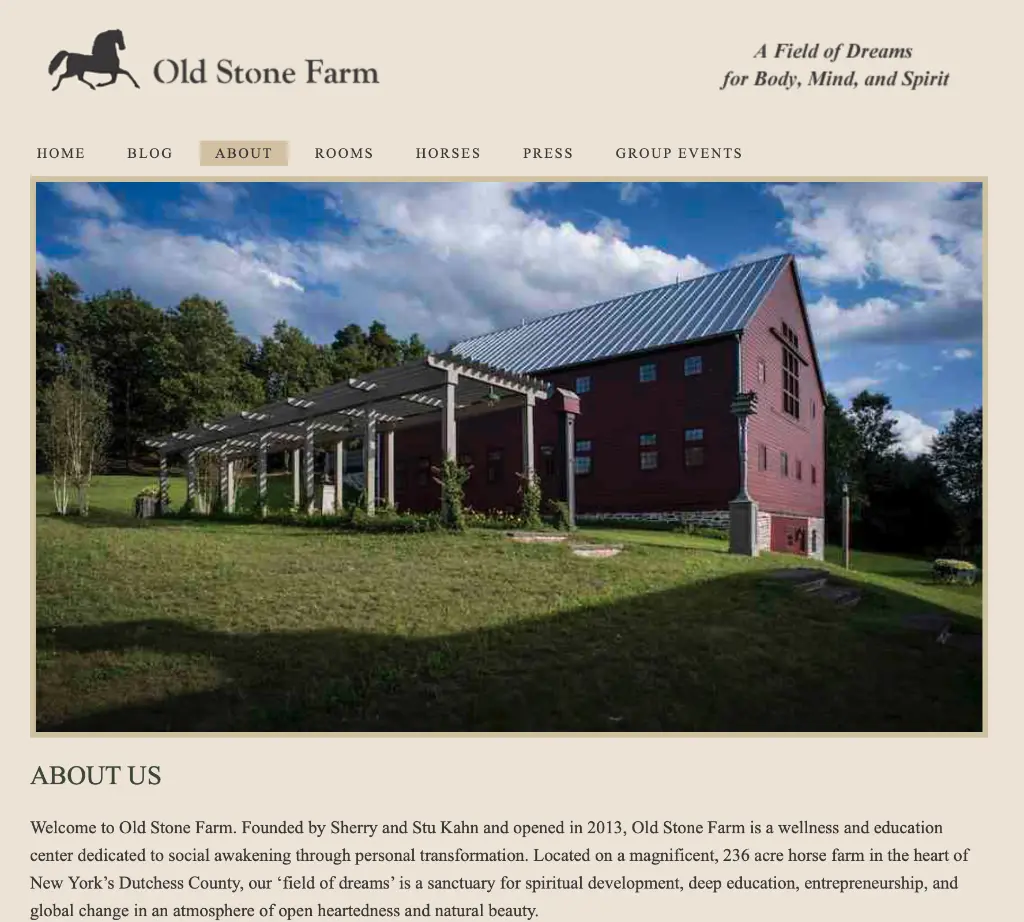
Special-Use Permit granted for small-scale facilities for a maximum of 28 guests. Owners Sherry & Stewart Kahn founded Old Stone Farm as a small-scale agriculture-based dude-ranch operation.

Clinton adopts Farmland Protection Plan designating the property as a prime agricultural area classified as an “Important Farmland Area". This classification is based on four agricultural resource attributes: prime farmland soils, soils of statewide significance, participation in the agricultural districts program and participation in an agricultural assessment program. The report notes that farmland and other open space lands generate more public revenue than they require in public services.
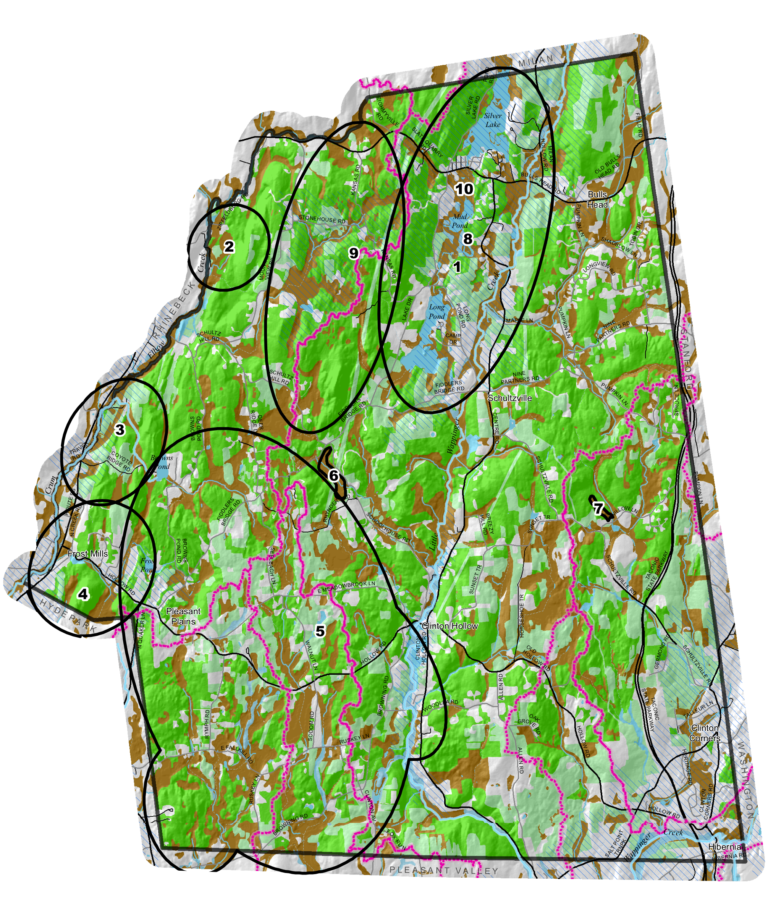
Town of Clinton adopts its Open Space Protection Plan, stating that the Town of Clinton desires to maintain its rural character consisting of natural landscapes, native ecosystems, working farms, hamlet-scale development and historic structures to preserve its scenic quality, promote its small-town atmosphere and protect quality of life. See property identified in Circle #3...
Rare Animal Species Map
Or see the full...
Clinton Open Space Protection Plan
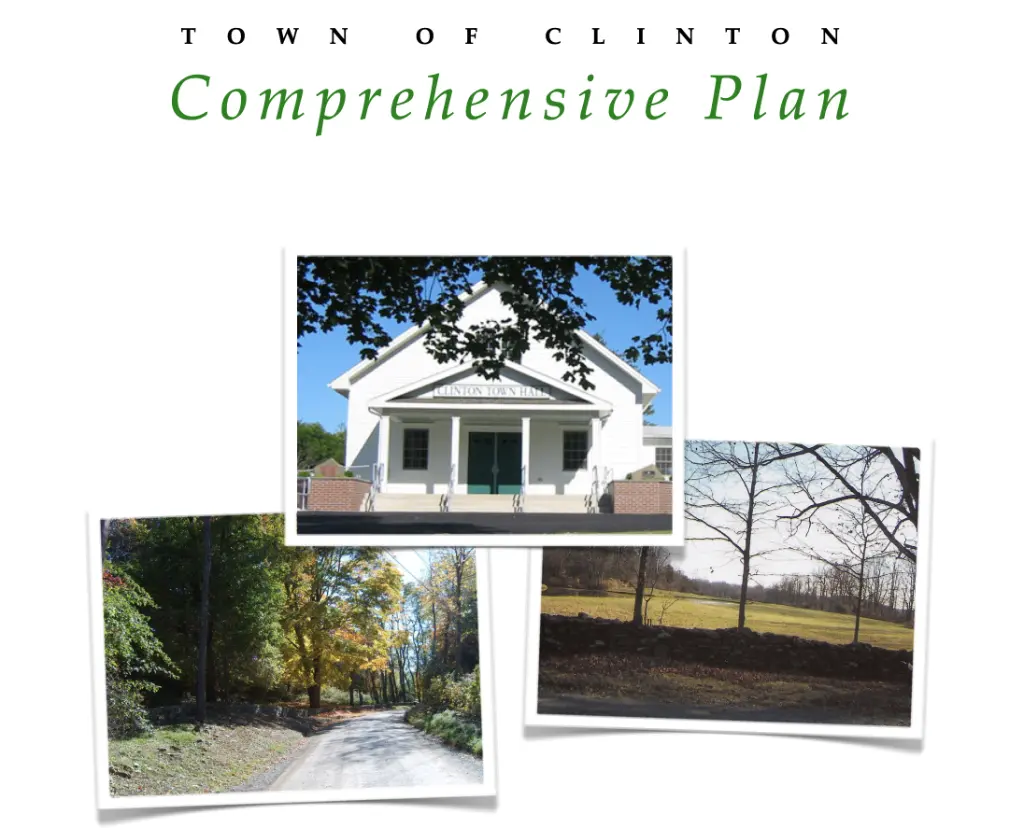
Town of Clinton adopts its Comprehensive Plan, concluding that The Town of Clinton desires to maintain its rural character, consisting of natural landscapes, native ecosystems, working farms, small hamlet-scale development and historic structures, while preserving its scenic quality, and to do so in a manner that continues to promote its small-town atmosphere and quality of life. Clinton Comprehensive Plan
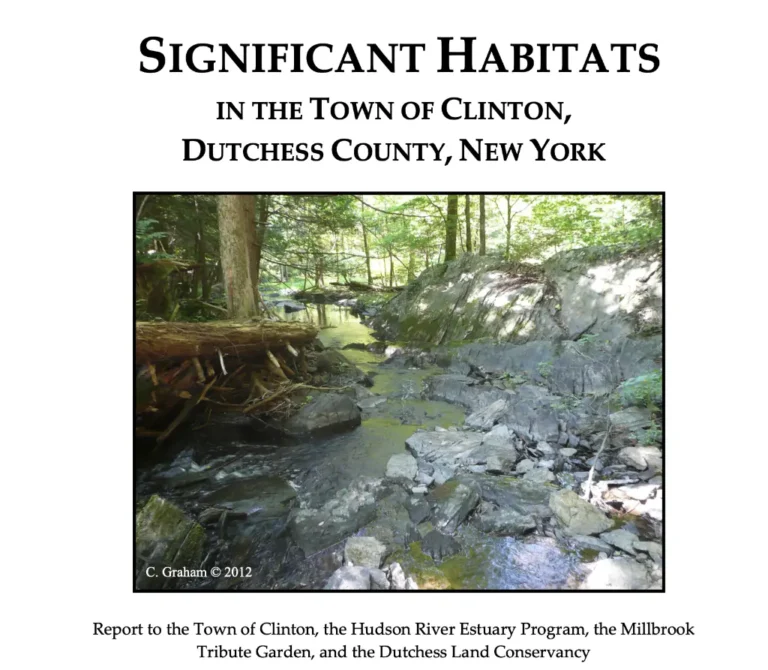
The Town of Clinton collaborated with Hudsonia Ltd. to conduct a comprehensive habitat mapping project resulting in the "Significant Habitats in the Town of Clinton" report. The property is included in that report raising numerous conservation concerns including forests, streams, significant habitat areas and watershed issues.
After the death of Mr. Stuart Kahn, the property was sold to The Dutchess LLC.
The property was renamed, "The Dutchess".
New owners unsuccessfully applied for a permit to expand the conference center use substantially by erecting 20 cabins and an event space for 250 people. The application was DENIED by the Town of Clinton.
An increase of 16 additional guests was approved, (along with construction of 5 yurts on wooden platforms), thereby maintaining the small-scale operations at maximum of 44 guests. DEC Declaration indicates Yurts will not be located near where Blanding's Turtle habitat nor wetlands. (Yurts were ultimately never built.)

The Dutchess property operates illegally as a “secret hotel”, restaurant and event venue, promoted through area media channels. These uses violated the Special Use Permit for a small-scale dude ranch and conference center and owners were cited many times for illegal operations.
A formal Stop Work Order was issued by the Town of Clinton to The Dutchess on June 11 2019 because The Dutchess was operating as a hotel and restaurant outside the use identified in their Special Use Permit, and therefore violating the Schedule of Use Regulations in the AR3 & AR5 Zoning Districts.
Notices of Violation were issued on The Dutchess because they continued operating unlawfully by hosting overnight guests and operating as a hotel.
The property known as The Dutchess is put on the market for sale, through Atelier Wendy Maitland Real Estate.
Town of Clinton holds offline workshop meetings during the pandemic to craft the 2021 Conference Center Law that laid the groundwork for the proposed resort hotel. Mr. Jeffrey Newman, The Dutchess Operations Manager, was invited to join this effort.
No records of these meetings nor its participants were ever made public.
Town of Clinton issued a Violation Notice & Cease-and-Desist order to The Dutchess, noting the advertising of The Dutchess as a Secret Hotel and Restaurant. Violations continued despite assurances from the property owners they would be remedied.
Town of Clinton ZEO e-mails with Operations Manager Newman & owner Chawla, noting continued advertising (and perhaps operations) of The Dutchess as a Hotel and Restaurant.
Town of Clinton adopts a new “Conference Center” Section of Town Laws after an online “Public Workshop” in Spring 2021 (while NY States pandemic restrictions on public events were in full force).
Conference Centers Law of 2021
Note: In March 2024, Mr. Newman asserts that the new law was intended to further restrict Conference Centers in the Town.
Violation Notice to The Dutchess from the Clinton Zoning Enforcement Officer dated July 1, 2021 noting numerous violations of the then-existing Special Use Permit. This included a violation for hosting a prohibited event (wedding) and erecting two tents without building permits.
The Dutchess operations manager Jeffrey Newman responds to Cease-and-Desist order from February 25 (5 months later), affirming that all hotel and restaurant operations have ceased.
At the same time, Mr. Newman also responds to the Violation Notice from July 1, with a schedule of work into 2022.
Partner of The Dutchess LLC, Rameet Chawla, scuttles a deal with a non-profit in equine therapy, and accepts insider offer from investors Chid Liberty & Annie Freeman. Property closes for $8.5 Million in September 2021.
Mr. Jeffrey Newman is let go from his Operations Manager position at the property.
IHG's Michael Palumbo contacts Wendy Maitland regarding property listed on her website, and despite being told it had recently sold (in Sept 2021 for $8.5 Million), he continues pursuit. (Ref: Wendy Maitland e-mail, Mar 2, 2024)
Wendy Maitland connects IHG's Michael Palumbo with Jeffrey Newman given his familiarity with the property and zoning laws. Mr. Newman works as a property consultant for IHG Six Senses developers for several months, prior to their final purchase.
Town of Clinton hires Jeffrey Newman as Municipal Code Enforcement Inspector (MCEI) and Mr. Newman terminates his consultancy with IHG.
IHG's Palumbo requests written confirmation of their plan to purchase the property with its Special-Use Permit as a Conference Center, also citing clear understanding of the 44-guest limit.
Jeffrey Newman, Clinton's Municipal Code Enforcement Officer (MCEI), authors a "Letter of Confirmation" to IHG, strongly asserting the 44-guest limit on the Special Use Permit.
IHG Six Senses (through affiliate CECNY LLC) completed purchase of the property, reported to have paid $13.75 million for the property, 60+% premium over the sale just 14 months earlier, despite understanding of 44-guest limitation on Special Use Permit.
QUESTION: Why would IHG Six Senses purchase such a property at such a premium unless they were already dishonestly plotting to exploit the town Conference Center Law's loophole that didn't specifically place clear guest caps on Conference Centers?
Town of Clinton MCEI Jeffrey Newman advises the Planning Board to forego a wetlands permit required by the Clinton Zoning law, despite acknowledgement by New York's DEC that the activities affect Endangered species Blanding’s Turtle habitat.
Mr. Newman then urged skipping a coordinated SEQRA review and issuance of a negative determination on the spot. Source: Town of Clinton Planning Board Minutes March 7, 2023 at 12, pages 10-15.
Planning Board Minutes
IHG Six Senses formally submits Application to build a resort hotel. MCEI Newman “accepts” the IHG Application, approving it for Planning Board Review, stating it conforms with the new Conference Center Law. No mention is made regarding the previously cited 44-guest cap.
Source: Application Form signed off by MCEI Newman, May 2, 2023
See also May 16, 2023 Planning Board Minutes, pages 16-20.
Though not made public, word leaks out about the hotel plans and nearby neighbors begin to learn the extent of the planned resort hotel project. They band together to find out more, and strongly object since Clinton’s Comprehensive Plan and zoning laws do not permit large resort hotels in this agricultural and low-density residential zoned area.
Six Senses submitted an amended application to Town of Clinton for Site Plan and Amended Special Use Permit approval.
The public citizens group now Common Senses Hudson Valley (Common Senses HV), objected to the project as violating Clinton's Comprehensive Plan and a product of clear conflicts of interest. MCEI Newman recuses himself.
IHG Six Senses presented its refiled resort application project to the Clinton Planning Board in a Public “Workshop”. At this workshop, it was unclear what Six Senses was planning, with discussions about activities including "watching bee pollination" and massages.
Clinton's Planning Board adopted a resolution to classify the Project as a Type I action and circulated its intent to act as Lead Agency in a coordinated SEQRA Review.
Six Senses lawyers prepare lengthy analysis for Town of Clinton regarding the project and its legal status as a Conference Center. (The documents were not made available to residents for months despite FOIL Requests in early November 2023.)
Michael Cosenza, Clinton's Building Inspector issues a letter reaffirming recused MCEI Mr. Newman’s conclusions from September 2022 that IHG isn’t proposing a hotel, but clearly recognizing the large change in scale. And AGAIN, strongly affirming the 44-guest limit if IHG wishes to live under OLD Conference Center Law w/NO event limitations. IHG's request for expansion of structures and guests must be under NEW Conference Center Law of 2021 that provides Planning Board ability to limit Events.
The citizens group now known as Common Senses Hudson Valley, files letter to Clinton's Planning Board outlining the environmental concerns of allowing a large hotel resort to develop on the environmentally sensitive land.
Hyde Park's Zoning Administrator denied the IHG Six Senses Application on the grounds that commercial operations are impermissible in the Greenbelt District, regardless of whether they are a “hotel” or a “conference center”.
The citizens’ group Stop Six Senses NY (now Common Senses Hudson Valley), filed an appeal to the Clinton Zoning Board of Appeals (ZBA), arguing that the proposal is indeed for a hotel.
Hyde Park Zoning Administrator receives a letter from IHG Six Senses proposing to amend their application to remove the parking area, golf cart storage, and other structures from the Hyde Park parcel.
Common Senses Hudson Valley objects to IHG's amended plan for the Hyde Park parcel, arguing that Hyde Park must deny the application because neither hotels nor conference centers are allowed in Hyde Park's Greenbelt District.
The Hyde Park Zoning Administrator issues another Letter of Determination denying the IHG Six Senses amended application because the proposed use is not permitted in the Hyde Park Greenbelt district under the Hyde Park Zoning code.
Clinton Planning Board holds Workshops for IHG Six Senses, an IHG Consultant indicated that IHG Six Senses would not be providing more narrative detail unless and until the Planning Board gave their plan approval. (Ummmm... is that the way it works?!?)
The Town of Clinton Zoning Board of Appeals (ZBA) holds a hearing regarding the appeal filed by Common Senses Hudson Valley. IHG Six Senses itself refers to the "entrance to the hotel," which was noted as a potential Freudian Slip indicative of the project's true nature. A strong turnout, a full house of local residents attend and speak in opposition to resort hotel.
The Town of Clinton officially adopted its Natural Resources Inventory (NRI) developed over more than a year by the Town's Conservation Advisory Council (CAC) in collaboration with the New York State Department of Environmental Conservation's Hudson Estuary Program and Cornell Cooperative Extension Dutchess County. A key tool that identifies a number of environmental sensitivities of the land in question.
Common Senses Hudson Valley (CSHV) writes an eloquent summary discussing both Hyde Park Zoning and their Greenbelt District as well as Clinton's Comprehensive Plan and Open Space Protection Plan along with some pertinent extracts.
Town of Clinton Planning Board continues to hold IHG Six Senses workshops. The IHG traffic consultant repeatedly references the “hotel” classification, stating that “we're essentially looking at a 65-unit Resort-like Hotel” and that “hotel is the closest type of use” for traffic projections due to its essential feature: lodging.
175 Local Residents Tell Town of Clinton ZBA to Reject the proposed IHG Six Senses Application and Find it is an Impermissible Large Resort Hotel in a Low-density Residential/Agricultural Zone.
Hyde Park's Zoning Board of Appeals (ZBA) continues its Public Hearings on Six Senses Appeal, hearing new arguments from IHG Six Senses that the luxury resort hotel is really a "camp", a permitted use in Hyde Park.
The Town of Clinton Zoning Board of Appeals (ZBA) UPHELD the determination that the Amended Application constitutes a Conference Center under the Town Code. However, the ZBA reversed their ZEO's determination regarding the road frontage requirement, finding that the Amended Application does not meet this requirement. As a result of not meeting the road frontage requirement, the ZBA determined that the Amended Application is not in conformity with the Town Code and cannot proceed to the Planning Board for review. Clinton ZBA members commented that a project of this scale was "never contemplated in the Town's Comprehensive Plan" nor "envisioned by the Town Board when the new law was passed in 2021". The town ZBA shares various comments regarding the ruling.
3 members of Common Senses Hudson Valley met with Michael Whitton & Eliot Werner, Clinton's Town Supervisor & Deputy. CSHV members made their case and provided significant legal information and case law regarding the Conference Center Law's inconsistentcies with the Comprehensive Plan and the legal remedies available to the town to correct the law ASAP, including a moratorium that would include all unapproved (non-permitted) applications. It was made clear that such quick action after the ZBA ruling would best insulate the town from successful lawsuits from CECNY.
Mr. Whitton explained, "he knew many people in town were in favor of the development", but would not indicate why that could override the wishes of residents as expressed in the formal Comprehensive Plan.
Hyde Park ZBA affirms the Zoning Administrator's determinations that the resort hotel was not a permitted use in the Town of Hyde Park and therefore the IHG Six Senses application to use the access road was properly denied. (Their ruling is incredibly thoughful, well-reasoned, and complete... do read!)
A legal action, an Article 78 proceeding, was filed in Dutchess County by IHG’s affiliate CECNY Land Holdings, LLC (IHG Six Senses) against Clinton's Zoning Board of Appeals.
IHG Six Senses (through its affiliate, CECNY) filed a lawsuit against the Town of Hyde Park, its Zoning Board of Appeals (ZBA), the Zoning Administrator of Hyde Park, and also naming the Town of Clinton and its Town Board as defendants. With numerous claims, in essence, CECNY's against Hyde Park revolve around the arguments that Hyde Park is improperly considering the Clinton use in its zoning decisions regarding the access road, that the project constitutes a permitted or lawful continuing use (or a nonconforming use) under Hyde Park's regulations, and that it should not be classified as a prohibited "Lodging Facility" in Hyde Park.
At the urging of many Clinton residents at various points and culminating with a presentation during the public comment period at the October 2024
Town of Clinton officials and members of the public convene a Discussion Group to review conference center law and all agree (again) it is problematic.
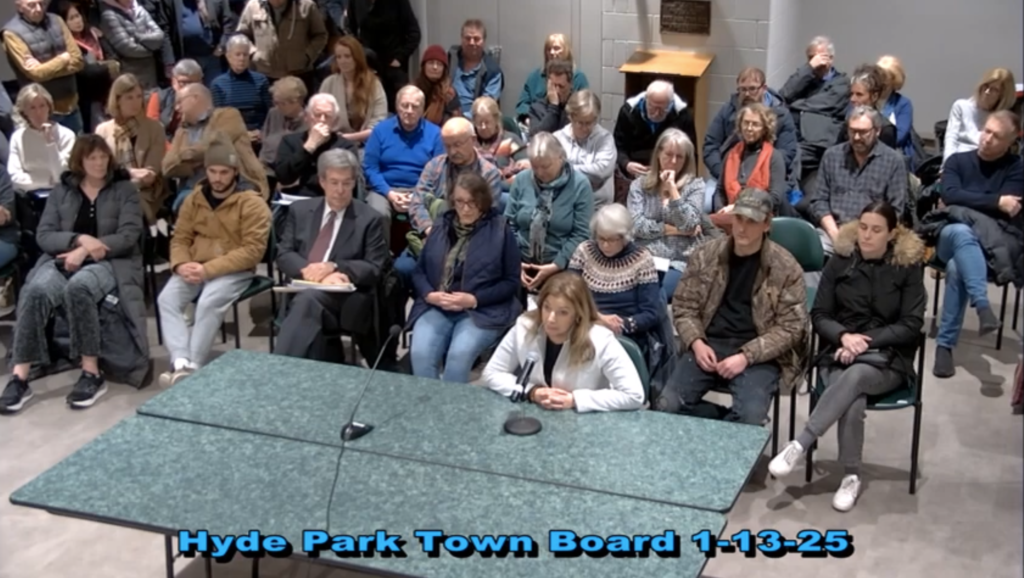
The Hyde Park Town Board passed Local Law G that amends Hyde Park’s zoning code to allow any road or driveway in the town to be used to access property in a neighboring locality, even if that property’s use violates Hyde Park’s own code. The public hearing was attended by over 150 people, with almost all opposing the new law specifically designed to facilitate the Six Senses project. During this meeting, the Hyde Park Supervisor explicitly stated the law was negotiated for Six Senses.
Despite vocal opposition from residents AND Hyde Park ZBA's chair AND detailed written concerns by Hyde Park's Conservation Advisory Council, the Town Board passed Local Law G by a narrow 3-2 vote (only Prine & Mesquita defended their residents, ZBA and Greenbelt.)
(Proposed Local Law G is now known as "Local Law 1 of 2025".)
The Clinton Discussion Group formed in Oct/Nov 2024 produces a short Resolution identifying the specific issues with the Conference Center Law of 2021, for the Clinton Town Board.
Town of Clinton Board fails to adopt a Resolution to create an Ad Hoc Committee to revise the flawed Conference Center Law. While the Town Board members AGREE the Conference Center Law is flawed and needs to be revised, they take advice from IHG Six Senses legal team and take NO action. (The Board Meeting video abruptly breaks once IHG Six Senses legal representatives take the podium, then picks up later.)
NO ad hoc committee, NO moratorium, just ongoing inaction by Clinton's Town Board.
A lengthy Town Board Meeting with many concerned residents urging the Town Board NOT to agree to IHG's proposed Settlement Agreement that would tie Clinton's hands and overturn its own ZBA. Many residents requested a Moratorium on Conference Center Applications. The town board instead voted WITH IHG Six Senses rather than it's residents, to let the IHG Six Senses proposal move forward with NO moratorium considered.
The Rhinebeck Town Board voted 4-0 to file a lawsuit against the neighboring towns of Clinton and Hyde Park over recent concessions made to IHG Six Senses developers. Rhinebeck is contesting both Hyde Park and Clinton overriding their zoning codes for a project that Rhinebeck anticipates will adversely impact all three communities. The proposed main entrance for the 240-guest resort hotel is off of Route 9G on the border of Hyde Park and Rhinebeck, and would see 400-600 cars coming and going per day, based on IHG Six Senses' own estimates. (That does not account for truck deliveries and services, nor we suspect traffic from special events like large weddings.)
Common Senses Hudson Valley & Town of Rhinebeck joined forces to protect residents' interests against IHG Six Senses. The lawsuit alleges that the Hyde Park Town Board illegally passed a law in January 2025 that overrode their own local officials’ decisions, discriminating in favor of IHG, ignoring environmental protections, undermining environmental justice and violating established legal precedent. The law effectively sacrificed local control and environmental safeguards for IHG’s corporate interests. Instead of standing by its ZBA, the Town of Clinton followed Hyde Park’s lead.
Recent media coverage of Rhinebeck's lawsuit includes an issue where the town clerk erroneously indicated public comment opportunity on the agenda before correcting. In social media and media comments, local business and real estate interests expressed outrage, some alleging corruption.
In response, ~50 local residents came out in force at the following meeting to express unbridled support for the Rhinebeck Town Board and the lawsuit, in the public comment portion of the meeting. Rhinebeck Town Board Meeting video:
On April 28th, CECNY filed a motion to have Warren Replansky removed from representing plaintiffs in the legal action, due to alleged conflicts of interest. The judge ruled that no credible facts were presented to back up CECNY's accusations, but rather mere conjecture and speculation.
Despite protests from residents, the Clinton Town Board passed a 6-month moratorium on all hotels motel and conference center applications, but made exception for ALL applications submitted in advance of the July 2, 2025, rendering the law completely toothless.
Given the Town Board's failure to act on the known loophole law despite public outcry for 2 years, this faux moratorium was perceived purely as an election-year stunt.
CECNY pressures the Clinton Planning Board to restart application review of the Six Senses resort hotel, in spite of the pending lawsuit. The Planning Board requests a formal ruling by the Clinton ZBA as to whether the criteria of their June 2024 ruling had now been satisfied. The Clinton ZBA ruled that due to the Town Board's sign-on to the Stipulation Agreement in March 2025, the criteria should be considered met, in spite of the pending lawsuit that challenges the legality of that very Stipulation Agreement and Hyde Park's Local Law 1.
CECNY submits Motion to Dismiss the whole lawsuit, claiming lack of standing of ALL petitioners, and the removal of Town of Rhinebeck as a petitioner, claiming breach of Open Meetings Law.
Judge's ruling is pending.
without subscribing to our e-mails! We keep e-mails to a minimum, reaching out when there is new information or we need your activism.
(We DO NOT share your information with anyone else.)